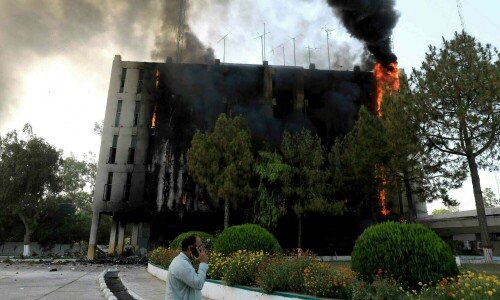KARACHI: The State Bank has removed the Minimum Deposit Rate (MDR) requirement for all conventional banks on deposits from financial institutions, public sector enterprises and public limited companies.
The State Bank issued two circulars on Tuesday for conventional banks and Islamic banking institutions (IBIs). The circulars carried several instructions specific to the IBIs.
The MDR is a regulatory mechanism introduced by the SBP to ensure depositors of conventional banks get 150 basis points less return than the prevailing policy rate. Every conventional bank is bound to pay 13.5pc to depositors as long as the key interest rate remains 15pc. Islamic banks are exempted from this condition.
According to the central bank, the MDR will now be applicable only to deposits of individual account holders.
Individuals’ deposits protected; instructions issued to Islamic banks for profit disbursement
“The Minimum Profit Rate (or MDR) requirement shall not be applicable to the deposits of financial institutions, public sector enterprises and public limited companies,” said the circular.
The new instructions regarding the removal of MDR will be effective from Jan 1 next year. Banking experts think the move will benefit those banks which have a higher mix of corporate deposits as they are no longer required to pay any MDR. The banks were bound to pay minimum returns below 1.5pc of the policy interest rate.
Now the banks will be able to negotiate the minimum rate with financial institutions, public sector enterprises and public limited companies.
Bankers said, however, the individuals have been saved by the State Bank as MDR will remain effective for individual deposits.
Profit Sharing on Saving Deposits of IBIs
Another circular issued by the State Bank said Islamic Banking Institutions (IBIs) shall pay profit on their rupee saving deposits (excluding deposits by financial institutions, public sector enterprises and public limited companies) equivalent to at least 75pc of the weighted average gross yield of all pools of an IBI.
“For the purpose of determining the gross yield of each pool, the monthly gross earnings of the pool shall be divided by the monthly average assets of the pool (excluding fixed assets),” said the circular. The pools created by IBIs for Shariah-compliant standing ceiling facility and Shariah-compliant open market operations (OMOs) will be excluded while calculating weighted average gross yield of pool(s), it explained.
“An IBI may forgo a part of its Mudarib share as hiba to meet market expectation in case of lower than expected market returns earned by the pool,” said the circular. However, IBIs maintaining PER (in Islamic banking, PER stands for “profit equalisation reserve”) will reduce their Mudarib share only if the PER is insufficient to improve the profit payouts to depositors”.
“If needed, IBIs may give hiba to saving account depositors to meet the requirement of minimum profit rate,” said the circular. The instructions shall be effective from Jan1 next year.
Sunny Kumar of Topline Research estimates that as per the annual accounts of all listed banks, the total deposit stands at Rs27 trillion, of which 53pc (Rs14tr) are corporate deposits.
The top conventional banks with a higher corporate deposit mix, ranging between 65 per cent and 88pc, are Bank of Punjab, Bank of Khyber, Samba Bank, National Bank and Askari Bank.
Other major banks like MCB Bank, Bank Al Habib, Habib Bank and United Bank have exposure to 35-40pc.
Published in Dawn, November 27th, 2024















































